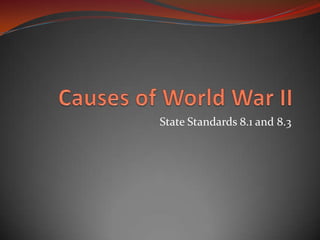
Causes of world war ii
- 1. State Standards 8.1 and 8.3
- 2. Totalitarianism Totalitarianism Total control of everything Led by a single leader Not interested in individual freedom (civil liberties) Used modern technology and propaganda
- 3. Totalitarianism. Dictators gave way to Totalitarianism in three countries 1. Soviet Union (Russia) 2. Italy 3. Germany
- 4. Russia Emergence of Stalin Leadership crisis in Russia gives rise to Stalin Iosif Dzhugashvili (Stalin) Stalin means “man of steel”
- 5. Russia. Stalin Starts out as Secretary General Uses this position to grow his power Works his way to becoming Dictator Establishes a powerful Communist State
- 6. Russia.. Collectivization Total government control of economic activity Especially what was produced and how Political Purges Stalin purges (cleans out) the entire government to eliminate all of his enemies Solidified his dictatorship
- 7. Italy Benito Mussolini Becomes the leader of the Fascist Party in Italy Fascism
- 8. Italy. Benito Mussolini Leads the Fascist Party’s military wing Black Shirts Overthrows the king of Italy and sets up his own Fascist government.
- 9. Italy.. Benito Mussolini Mussolini’s fascist government was a more relaxed version of Nazism Mussolini known as El Duce Wanted to restore Italy to its former glory
- 10. Japan • Split version of Totalitarianism • Emperor Hirohito • Godlike leader of the government • Hideki Tojo • Leader of the military • Held most of the power • Inspired by dreams of Japanese greatness.
- 11. Dark Clouds on the Horizon Three of the most powerful countries in the world were now controlled by single leaders 1. Stalin in Russia 2. Mussolini in Italy 3. Tojo in Japan
- 12. Dark Clouds on the Horizon. Great Depression had led to the rise of dictators Bad economies had given the Dictators the chance to rise to power The fourth and most powerful dictatorship was yet to come Nazi Germany
- 13. Hitler’s Early Life Poor student Dropped out of school at 16 Wanted to become an artist or architect Could not gain admission to any schools to study Military Career Joins German Army when World War I starts Wounded twice Earned five medals
- 15. Hitler’s Abilities Hitler joins the German worker’s Party Becomes NAZI Party Political Oratory Excellent public speaker Had excellent Leadership abilities 1921 Voted the Fuhrer (leader) of the NAZI party
- 16. The Nazi Party Violently Nationalistic Storm Troopers (SA) The Nazi’s military force Anti-Semitic Hatred of Jews Looked upon the German people as superior to other races Believed the Jews were an inferior race
- 17. Hitler in Prison Hitler is thrown into prison for a failed attempt to overthrow the government While in prison he writes Mein Kampf (My Struggle) Book about Hitler’s major views 1. Outlined his belief in the superiority of the Aryan Race 2. Outline his plan for taking control of Europe 3. Conquest of Lebensraum Living space for the German people
- 18. To Total Power To Power Nazi Party gains power quickly and Hitler becomes Chancellor of Germany Hitler eliminates the Government Becomes the complete dictator of Germany Third Reich Hitler’s name for his new Empire Hitler predicts his new Reich will last 1,000 years
- 19. Dictator. Hatred towards Jews Gestapo Secret Police that begins to relentlessly track down enemies of the state Constantly hunted down Jews and Hitler’s Enemies
- 20. Isolationists Isolationism Not becoming involved in other nation’s issues American Neutrality Act US is neutral but can sell weapons to Allies Lend Lease Bill US can “lend or lease” weapons to Britain that will be repaid after the war
- 21. American Policy Toward Japan Japan becomes aggressive in the Pacific American Embargo Stopped exports of aviation fuel and iron to Japan Japan has no resources to supply their Empire What should Japan Do?
- 22. American Policy Toward Japan. ATTACK! Decides to attack the American Fleet at Pearl Harbor, Hawaii Must destroy the Pacific Fleet in the Pacific
- 24. Pearl Harbor December 7th, 1941 Radar station on Hawaii detects oncoming Japanese planes Report is ignored because operators think it is an expected shipment
- 26. Pearl Harbor. Devastating Attacks 2,400 American lives lost Japan loses 29 planes Disaster for America Boats and Planes had been parked closely together America’s Pacific Fleet crippled
- 27. American Response Isolationism is OVER! FDR calls emergency meeting of Congress Day of Infamy Speech Asks Congress to declare war against Japan Congress declares war
